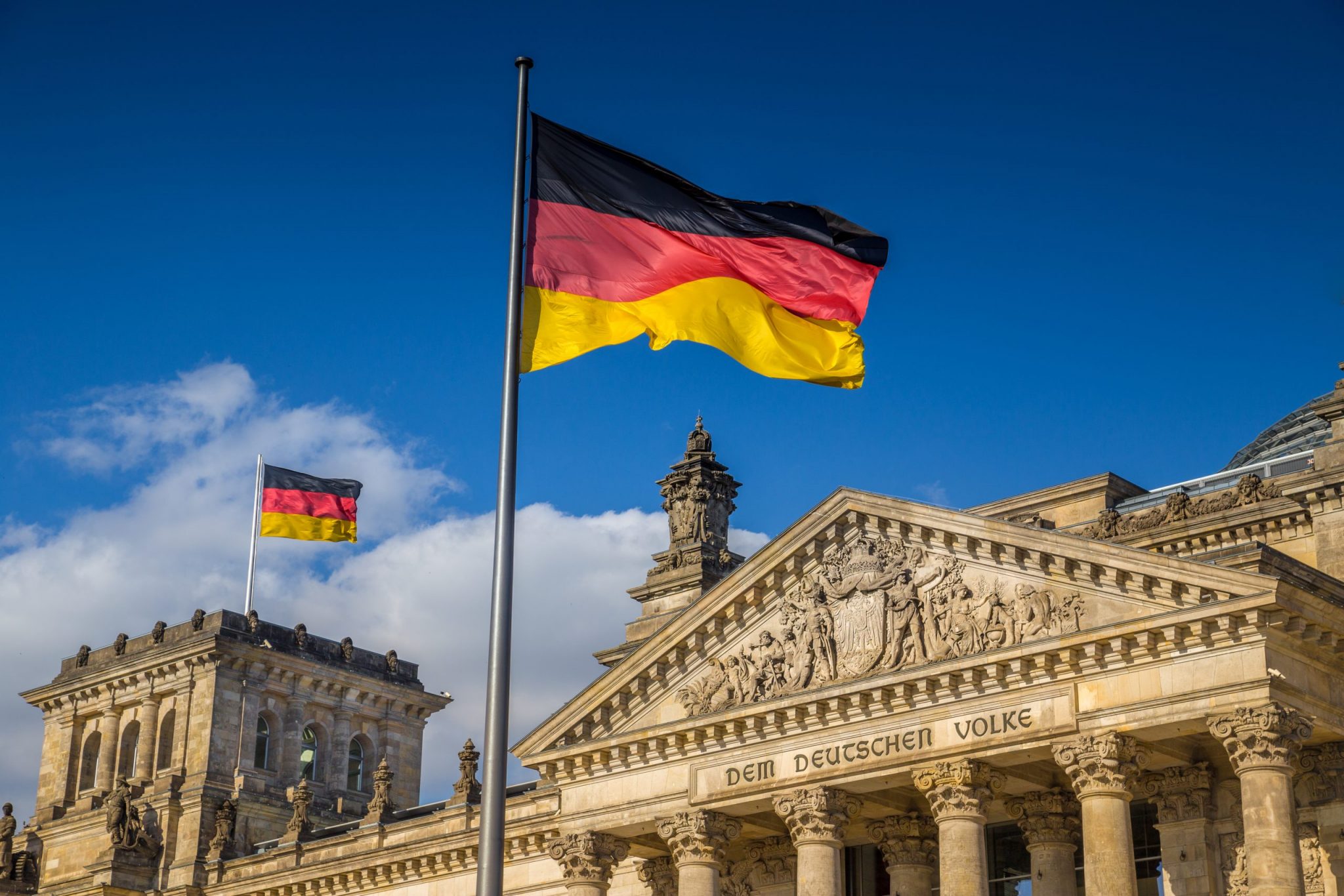What We’re Seeing on the 2021 German Elections Dashboard
Russia
Covid-19
Following April’s trend, Russian state-backed actors continued their extensive coverage of coronavirus-related topics. Six of the seven most watched YouTube videos from RT Deutsch during the month of May dealt with Covid, primarily stoking fears about vaccinations by highlighting concerns about potential risks. This focus on vaccines was also apparent in other Russian state-backed media outputs: all of the five website articles that received the most engagement covered vaccinations. Out of all Twitter accounts monitored on the dashboard, RT Deutsch was the most active in pushing the German-language hashtag for the word “vaccination” (#Impfung), demonstrating Russian state media’s outsized focus on the topic. RT Deutsch was also the most influential account associated with the key phrase “AstraZeneca.”
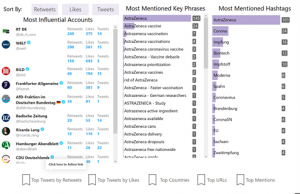
The most influential accounts associated with the key phrase “AstraZeneca” between May 1 and May 31, 2021
In tweets mentioning the “AstraZeneca” and “Pfizer” vaccines, both RT Deutsch’s and SNA’s Twitter accounts pushed narratives spreading doubts about vaccine effectiveness or the management of the vaccination rollout, highlighting alleged negative side effects, including deaths.
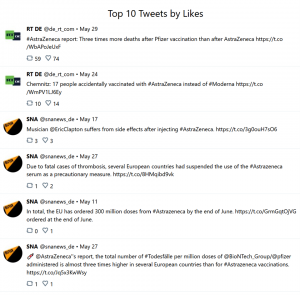
Most liked tweets between May 1 and May 31, 2021, mentioning the AstraZeneca or Pfizer vaccines.
SNA in particular spread doubts about the quality of the BioNTech/Pfizer vaccination.

Beyond amplifying reports of adverse reactions to Western vaccines, monitored Russian state-backed media accounts also published misleading information on other vaccination-related topics, many of which received high engagement on Twitter. The headline of one RT Deutsch article falsely suggested that vaccinations would become mandatory for Berlin students. The article later clarified that while vaccinated children would be exempted from mandatory coronavirus testing, no vaccine would be mandatory for students. Similarly, another article stoked fears about the creation of a so-called “Covid apartheid” between vaccinated and non-vaccinated citizens. Meanwhile, an RT Deutsch tweet claimed that the Indian government had objected to the German media’s warnings about the so-called Indian variant, creating uncertainty about the threat. In fact, the Indian government had only rejected using the term “Indian” for the B.1.617 variant.
German Election Campaign
Annalena Baerbock, the chancellor candidate of the Green party, received significant attention from Russian state-backed media in May. Besides Vladmir Putin, she was the only politician to appear in the top ten most mentioned hashtags from the Russian actors monitored on the dashboard.
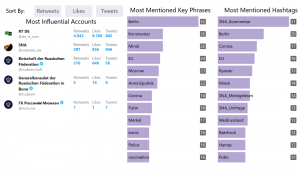
Top hashtags used by Russian government and state media accounts targeting German audiences between May 1 and May 31, 2021
In one tweet, RT Deutsch accused Baerbock of plagiarism; however, in the linked article it became clear that the plagiarism was not referring to any academic work but a sentence on Baerbock’s website that appeared to be copied from United States President Joe Biden’s climate policy plan. Moreover, Russian state-backed media highlighted Baerbock’s support for higher gasoline prices and the establishment of a speed limit—narratives that resemble the yellow vest protests that shook France in 2018.


Examples of RT Deutsch tweets mentioning the Green candidate Annalena Baerbock
Foreign Policy
Russian state-backed media extensively covered the Ryanair incident, in which Belarus rerouted a plane to Minsk to arrest a Belarusian opposition blogger. RT Deutsch mentioned “Minsk” more often than any other monitored account, as they attempted to normalize the event and draw attention to other allegedly similar cases. The most re-tweeted post about the topic compared the event to the 2013 forced landing of a plane carrying former Bolivian President Evo Morales that had been rerouted to Vienna in an attempt to arrest National Security Agency whistleblower Edward Snowden. In a further attempt to create a false equivalency, RT Deutsch also pointed out an unscheduled plane landing in Berlin a few days after the Minsk incident.
China
Germany, due to its important economic position as one of China’s main trading partners and its political standing as the most powerful country in the European Union, constitutes a particularly attractive target for Chinese information operations. To date, however, China’s messaging in Germany has largely revolved around coverage of its own domestic affairs rather than Germany’s. In May, Chinese diplomats and state media focused on the situation in Xinjiang, as evidenced by the fact that the top key phrase and the most mentioned hashtag used by Chinese state-backed actors was “Xinjiang.” Foreign countries, Germany included, barely registered in China’s German-language posts during May.
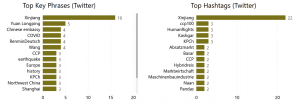
The top key phrases and hashtags used by Chinese diplomats and state media outlets targeting German audiences between May 1 and May 31, 2021
In Xinjiang-related tweets, Chinese accounts highlighted the beautiful nature and cultural highlights of the region, and dismissed reports about human rights violations as disinformation. Exchanges between German representatives and officials from the Xinjiang region were also emphasized, underscoring the narrative that the Chinese government is transparent about the situation in Xinjiang and can be trusted in their denials.



Examples of Chinese diplomatic coverage of Xinjiang
Chinese-backed accounts moreover emphasized the achievements of China and the Chinese Communist Party with regards to economic growth and technological development. The death of Yuang Longping, who studied and invented hybrid rice, received significant coverage, as Beijing presented Longping as the embodiment of Chinese progress and advancement.




Examples of Chinese state media and diplomats marking national advancements in the wake of Yuang Longping’s death
Turkey
Turkey possesses a special interest in Germany due to the large Turkish diaspora in the country. Ethnic Turks constitute the largest ethnic minority in Germany and form the largest Turkish population in the country’s diaspora. Just under three million people of Turkish origin live in Germany, around half of whom have Turkish citizenship and can therefore also vote in Turkey. Hence, Germany presents an important site for Turkish reporting. The Turkish government also has a track record of using deceptive online practices to manipulate domestic audiences, raising the prospect that they may use information operations to target audiences outside its borders in the future.
Turkey’s coverage in May focused on the conflict in Israel and the Palestinian territories. Compared to the monitored German and Russian media, Turkish actors dedicated particular attention to the situation of Palestinians, as the dashboard illustrates below.
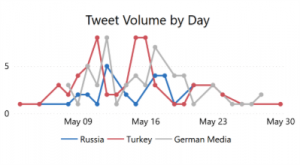
Mentions of Palestinian Territories by monitored Russian, Turkish, and German media accounts between May 1 and May 31, 2021
Turkish state-backed media channel TRT Deutsch’s coverage of the conflict received particularly high engagement. May’s top tweet quoted an opposition member of the Knesset calling the Israeli administration a “neo-Nazi government.” In the context of the Israeli-Palestinian conflict, the outlet also raised doubts about whether German public media respected free speech regarding negative coverage of Israel.
After members of the Turkish community had been accused of anti-Semitism in the context of pro-Palestinian protests, Turkish diplomatic accounts also took a stand, defending demonstrators’ rights to protest against alleged Israeli human rights violations.
The views expressed in GMF publications and commentary are the views of the author alone.

